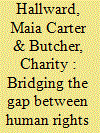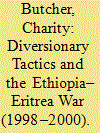| Srl | Item |
| 1 |
ID:
152738


|
|
|
|
|
| Summary/Abstract |
While the concepts of human rights and peace are increasingly linked in the study and practice of International Relations, there is great variance and inconsistency in how the concept of peace is discussed in the study and practice of human rights. We conduct an examination of the websites of human rights nongovernmental organizations (NGOs) affiliated with the United Nations Human Rights Council in Geneva, Switzerland, to explore whether and how human rights and peace are linked. Religiously-affiliated and women’s NGOs typically link these concepts, while non-Western NGOs stress peace over human rights.
|
|
|
|
|
|
|
|
|
|
|
|
|
|
|
|
| 2 |
ID:
168262


|
|
|
|
|
| Summary/Abstract |
Diversionary theories of war suggest that leaders may engage in bellicose foreign policies to divert the public’s attention from domestic problems and capitalize on a ‘rally around the flag’ type of effect. The evidence regarding diversionary theory is quite mixed. More recently, scholars have focused on situations that create opportunities for diversionary behavior, such as international rivalry and territorial disputes. This paper adds to the growing literature on diversionary conflict by considering the Ethiopia–Eritrea case and applying an opportunity-based approach. We assess whether the Ethiopia–Eritrea War (1998–2000) is consistent with diversionary explanations for the war, as many have previously claimed.
|
|
|
|
|
|
|
|
|
|
|
|
|
|
|
|
| 3 |
ID:
114089


|
|
|
|
|
| Publication |
2012.
|
| Summary/Abstract |
Most undergraduate courses on foreign policy discuss important models and explanations of foreign policy decision making, such as the rational actor, organizational process and governmental politics models, and groupthink. It is often difficult for students to fully understand how to apply and use these concepts to analyze foreign policy decision-making processes. One way to encourage such analytical thinking is to have students utilize various models to explain a specific event. While this is a useful task, students often gain a greater level of comprehension when they are evaluating a decision-making process in which they have personally taken part in. As such, role-playing simulation can be a very effective tool in helping students learn to understand and, more importantly, apply these various decision-making models and explanations. This paper presents an example of how simulations can help teach these concepts by presenting specific information regarding a simulation of US-Iranian relations.
|
|
|
|
|
|
|
|
|
|
|
|
|
|
|
|
| 4 |
ID:
148927


|
|
|
|
|
| Summary/Abstract |
This article evaluates the effects of terrorism on interventions into civil wars. Considering civil wars from 1970–1999, this study analyzes how the use of terrorism as a tactic affects external interventions on behalf of opposition groups, interventions on behalf of governments, and diplomatic interventions. While some authors would suggest that groups might utilize terrorism as a tactic to gain external support, this study finds little evidence that groups are actually successful in gaining such support. In fact, terrorism that targets civilians appears to actually decrease the likelihood of military interventions on behalf of opposition groups. Furthermore, in civil wars with high numbers of terrorist attacks there is a greater likelihood of economic intervention on behalf of governments, further weakening the potential benefit for groups in utilizing terrorism as a tactic. While this is certainly a welcome finding, a consideration of five case studies of suicide terrorism (Lebanon, Sri Lanka, Iraq, India, and Turkey) provides evidence that the use of suicide terrorism within civil wars may have decreased the likelihood of external interventions on behalf of the government and of diplomatic interventions. These results are more troubling and suggest potentially grave consequences for mediating many of these conflicts.
|
|
|
|
|
|
|
|
|
|
|
|
|
|
|
|